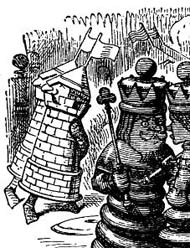 So yeah, I haven’t really tended to be one of those fancy-schmancy bloggers who manage to blog about things on the same actual day they happen. My schedule tends to keep me careening along in panic for several days at a go, and then I manage to steal a few hours to spit out a few blog posts, and then I start storing up links and snippets of things I’ve read until the next time I get a chance to blog.
So yeah, I haven’t really tended to be one of those fancy-schmancy bloggers who manage to blog about things on the same actual day they happen. My schedule tends to keep me careening along in panic for several days at a go, and then I manage to steal a few hours to spit out a few blog posts, and then I start storing up links and snippets of things I’ve read until the next time I get a chance to blog.
But what with all the moving and the five-alarm copyediting project, there’s been so little bloggery around these parts the last few weeks I barely know where to begin. My links and snippets are piled up so high they rival the stacks of cardboard boxes in the room that may one day be my TV room, if I ever manage to create enough space in there.
Well — how about this, for starters. This piece is almost a week old, but I think it’s definitely one of the past week’s must-read stories.
So, in case you missed it: Cheney, Bush, and their cheering section at Fox News have spent most of the decade arguing that see, we have to torture people in order to Defeat Evil and Keep America Safe. But everything will be okay if we just don’t call it torture or admit that we’re doing it! Okay?
But now a group of US veterans have stepped forward to politely point out that they never found it necessary to torture anyone when they successfully interrogated Nazis during World War II.
For six decades, they held their silence.
The group of World War II veterans kept a military code and the decorum of their generation, telling virtually no one of their top-secret work interrogating Nazi prisoners of war at Fort Hunt.
When about two dozen veterans got together yesterday for the first time since the 1940s, many of the proud men lamented the chasm between the way they conducted interrogations during the war and the harsh measures used today in questioning terrorism suspects.
Back then, they and their commanders wrestled with the morality of bugging prisoners’ cells with listening devices. They felt bad about censoring letters. They took prisoners out for steak dinners to soften them up. They played games with them.
“We got more information out of a German general with a game of chess or Ping-Pong than they do today, with their torture,” said Henry Kolm, 90, an MIT physicist who had been assigned to play chess in Germany with Hitler’s deputy, Rudolf Hess.
… The interrogators had standards that remain a source of pride and honor.
“During the many interrogations, I never laid hands on anyone,” said George Frenkel, 87, of Kensington. “We extracted information in a battle of the wits. I’m proud to say I never compromised my humanity.”
I can’t help thinking of something Isaac Asimov once wrote:
Violence is the last refuge of the incompetent.
Unless you’re very, very incompetent. In which case, it’s probably the first and only thing you try.

Excellent Asimov quote. The only drawback to the interrogation techniques mentioned is they take more time. On the other hand, I’m betting in close to all of the real-world interrogation situations, they have that kind of time.